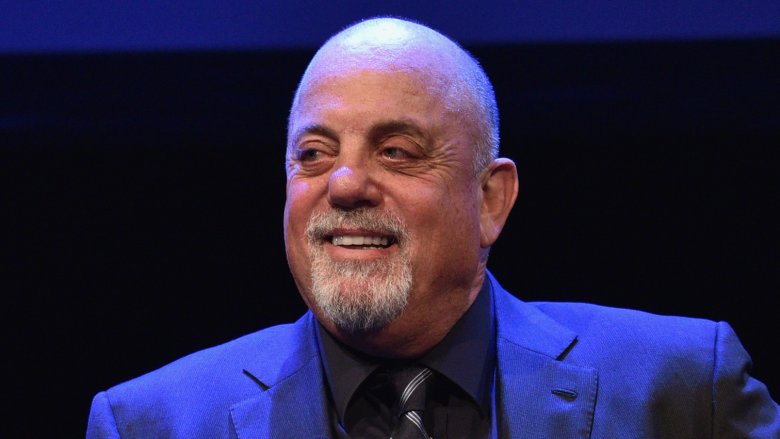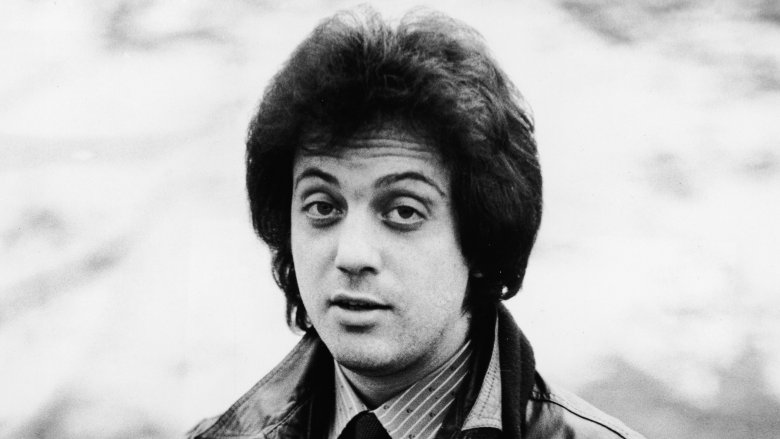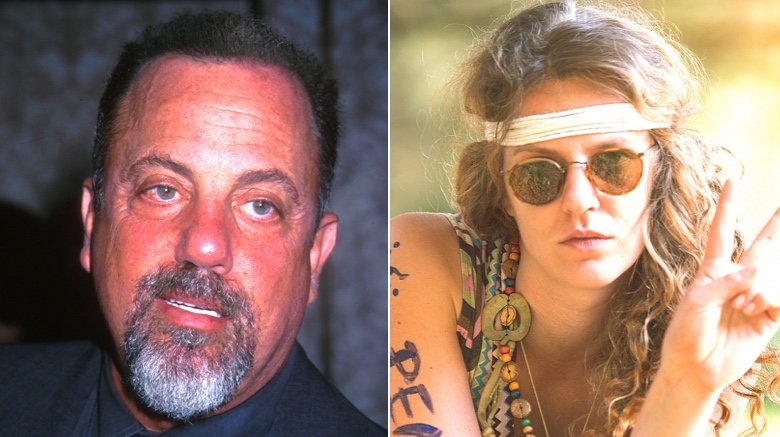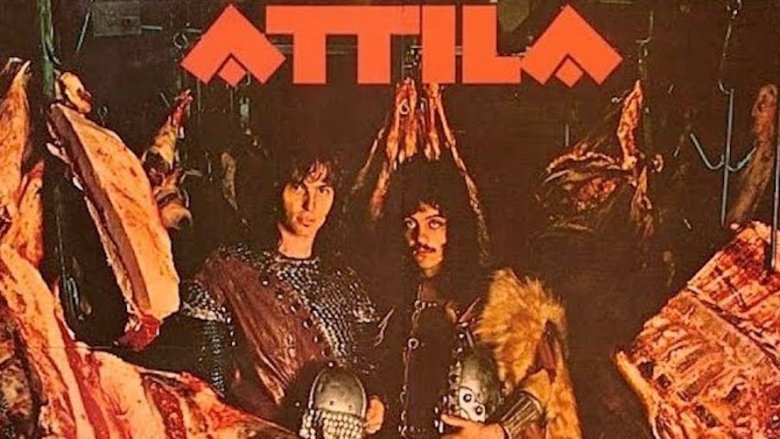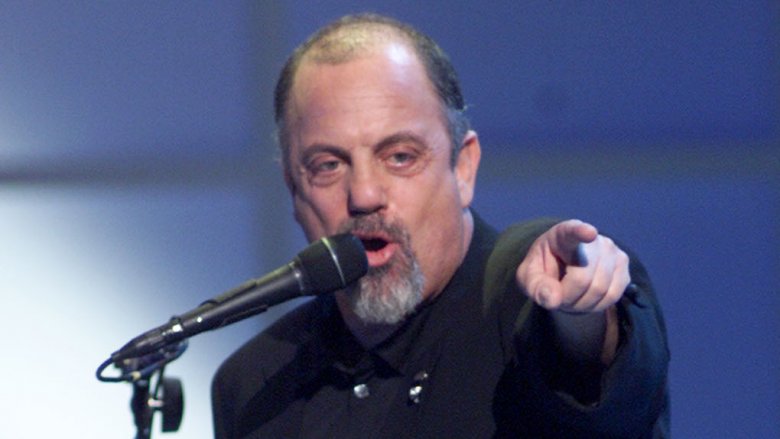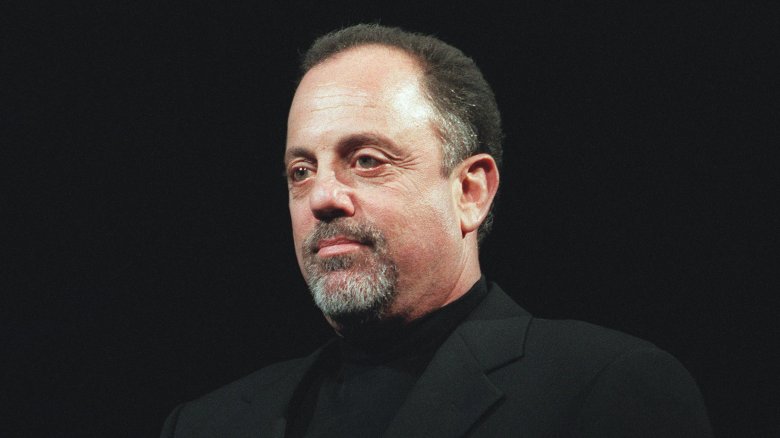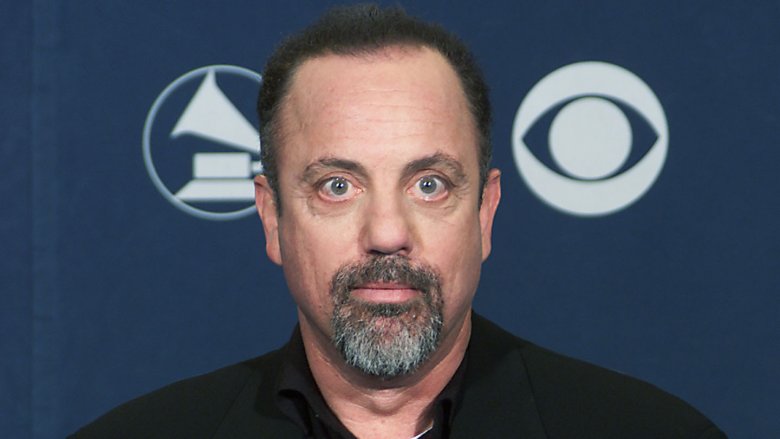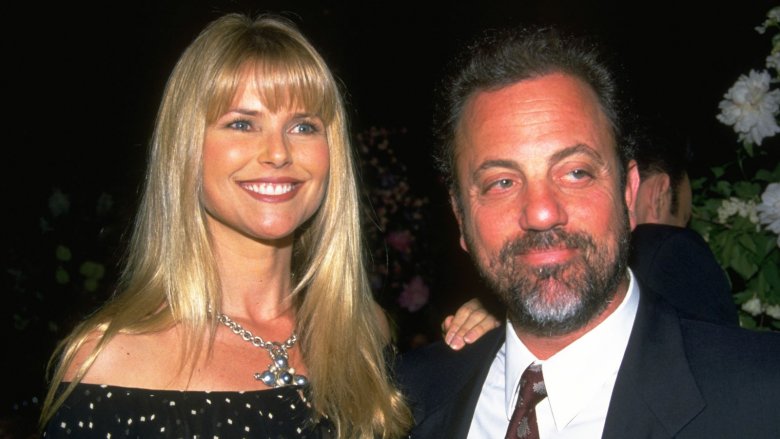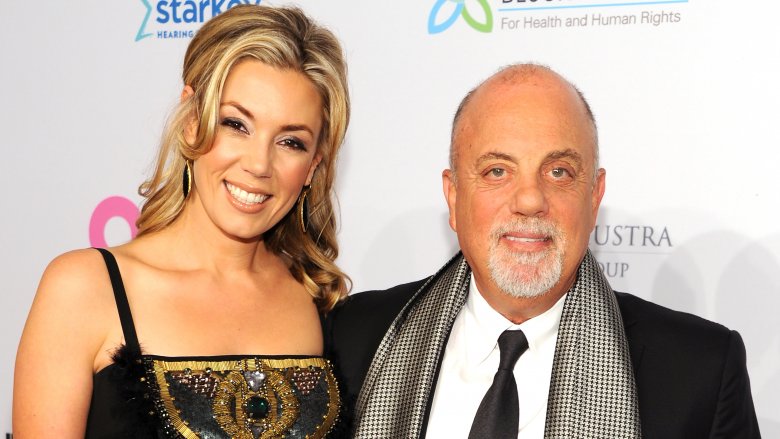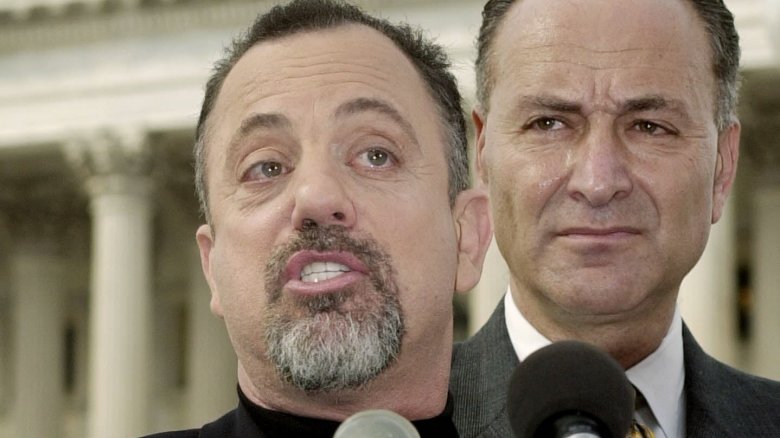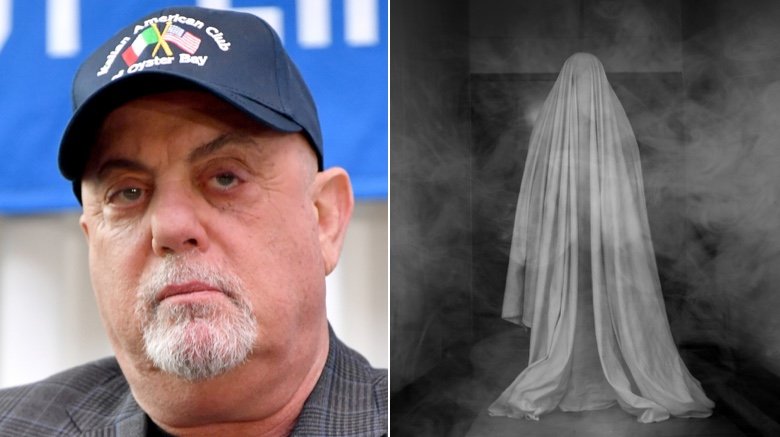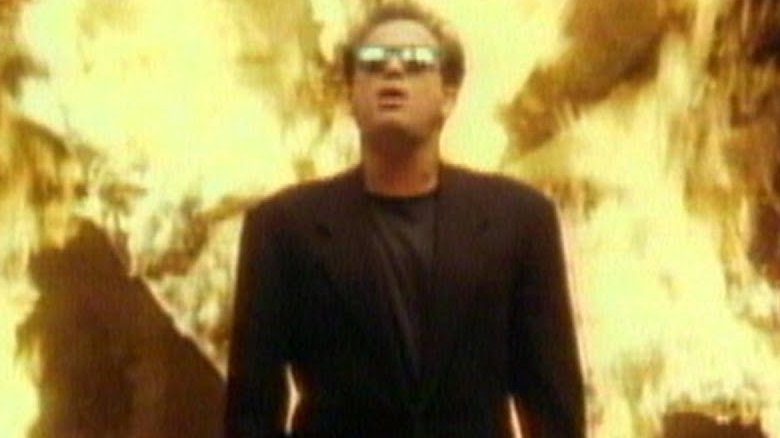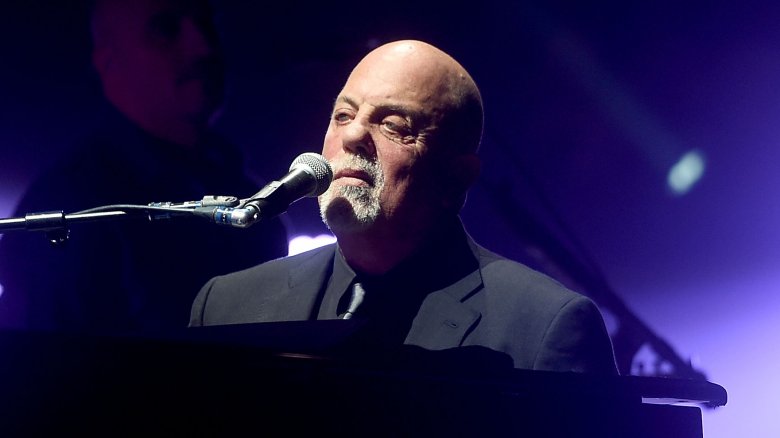The Untold Truth Of Billy Joel
Plenty of people would state their undying love for Billy Joel. Over a nearly 50-year career as a piano-playing, big-voiced, American answer to Elton John, he's sold 150 million copies of albums like The Stranger and River of Dreams, while churning out singles like the insanely catchy "Uptown Girl," the mile-a-minute history lesson "We Didn't Start the Fire," and the wedding reception standard "Just the Way You Are." Then there's the sad, irresistible singalong "Piano Man," a song so iconic it earned Joel his nickname — he's "the Piano Man" now. In short, everyone has one Billy Joel song they love, at least secretly.
As one of the biggest pop and rock stars in the English-speaking world, Joel has made the news a lot — not just for his musical accomplishments, but for his romantic entanglements and tabloid scandals. The New Jersey native has lived a colorful life, to say the least. Here are some amazing little-known stories from the life of Billy Joel that, quite frankly, would all make excellent Billy Joel story-songs.
He played piano on a famous song when he was a teenager (he thinks)
Surpassing even "Last Kiss" and "Teen Angel," the Shangri-Las' 1964 #1 hit "Leader of the Pack" is probably the greatest — and most hilariously over-the-top — of a subgenre that humorist Dave Barry nicknamed "teen death songs." They're maudlin songs about teenagers perishing, usually in traffic accidents; "Leader of the Pack" even includes some gruesome car-crash sound effects. It also boasts a dramatic piano part that sounds like it was adapted from the musical accompaniment of a silent melodrama where a mustachioed villain ties a woman to train tracks. Tickling the ivories to make that all possible: Billy Joel, who would've been just 15 or 16 at the time.
Well, probably. Okay, maybe. Even Billy Joel isn't sure if he played on the version of the song released to radio and pressed to millions of 45s in the mid-1960s. In 2005, he told Rolling Stone that he worked with producer "Shadow" Morton on a session that lasted for "two songs: 'Remember (Walkin' in the Sand)' and 'Leader of the Pack.' We did the recordings before the Shangdi-Las sang on them. I'm pretty sure it was me." However, he said he later read an interview with the song's co-writer, Ellie Greenwich, who denied it was Joel on the track. "I never got paid, though," Joel shrugged, "so it doesn't make any difference."
By the time he got to Woodstock (he was ready to leave)
The Woodstock Music and Art Festival — or just "Woodstock" for short — became one of the most legendary musical and cultural events in American history, even while it was still happening that one fateful weekend in August 1969. Symbolic of the "hippie" and "countercultural" movements of the late '60s, somewhere in the neighborhood of half a million tie-dye-wearing longhairs descended on Max Yasgur's farm in upstate New York to see and hear some of the most legendary bands of the era perform. Among the acts taking the stage: the Who, Jefferson Airplane, the Band, Janis Joplin, Santana, and Jimi Hendrix.
Billy Joel was there, too, although not as a performer; he hadn't released any music under his own name at that point. No, Joel made the journey from the New York metropolitan area up to Woodstock because he wanted to see the great Hendrix shred. But when he got there, he quickly realized he'd made a terrible mistake. First of all, Country Joe and the Fish were on the bill, and he didn't care for that act, specifically their hamfisted protest anthem "I-Feel-Like-I'm-Fixin'-to-Die-Rag." "I don't like somebody telling me how to think," Joel quipped while discussing his Woodstock experience at a Sirius Town Hall event in April 2014. And wouldn't you know, he didn't even get to see Hendrix. He found the portable toilets so disgusting that he left before the guitarist took the stage.
Being a Hun was not much fun
Billy Joel might technically be rock history's most successful case of a band member "going solo." Before he ever released a "Billy Joel" record, his first publicly-available album was the 1970 self-titled album by his band Atilla. It wasn't so much a band as it was a duo, consisting of Joel on organ and keyboard and Jon Small on drums. And it doesn't suggest in the least that one of those musicians would go on to sing "Tell Her About It" or "For the Longest Time," because Atilla was a psychedelic-influenced progressive rock/jazz/metal fusion outfit (you know, one of those).
Among the hilariously and perfectly named tracks are "Brain Invasion," "Tear This Castle Down," and "Amplifier Fire: Godzilla/March of the Huns." On the cover, Joel and Small are dressed like ancient Hun warriors, and that's not even the silliest thing about the album. All Music Guide says Atilla "undoubtedly is the worst album released in the history of rock & roll." Wow.
Billy Joel will steal your wife
Billy Joel met Elizabeth Weber, the woman who would become his first of four wives, in 1970. "She wasn't like a lot of the other girls I knew at the time who had taken home ec and cooking classes," Joel told biographer Fred Schruers (via PageSix), adding that she was "intelligent and not afraid to speak her mind, but could also be seductive." Weber liked him back, but there were a few hindrances to a relationship. She had a baby son, and was already married ... to Joel's Atilla partner, Jon Small.
When Small found out, Weber dumped both guys and ran away for a few weeks. But eventually, she came back, divorced Small, and in 1973, married Joel. The relationship finally ended with a contentious divorce in 1982, but hey, at least there were apparently no hard feelings between Joel and Small — his former bandmate and romantic rival directed quite a few Billy Joel music videos.
His ill-fated suicide attempt fortunately backfired
The year 1971 was not a good one for Billy Joel, according to a 2006 profile in The Times of London (via Medium). He released his first solo album, Cold Spring Harbor, in 1971, but it was a commercial flop and Joel hated it (for one thing, a mistake in the mastering process gave him a comically high voice on vinyl). He ran out of money, and to pay the bills, he took a job in a factory, right around the time that Elizabeth Weber dumped him. And so, Joel decided to end his own life. He first tried to overdose on the barbiturate Nembutal, taking a large dose before calling Jon Small to apologize for ruining his marriage. Small saved his life, getting Joel to a hospital for an emergency stomach pumping.
Soon after, Joel attempted suicide once more, this time with furniture polish. "I looked in my closet and said, 'Okay, I'm going to do myself in — what have we got here?' There was chlorine bleach and there was furniture polish," Joel told The Times. "At the time I was thinking, 'Hmm ... which one will taste better? Well, the furniture polish said that it was lemon-scented, so I figured it had to be that one.'" Joel survived the attempt, but says he "just farted furniture polish" before seeking professional help at a mental health facility.
If you or anyone you know is having suicidal thoughts, please call the National Suicide Prevention Lifeline at 1-800-273-TALK (8255).
That time he accidentally wrote a #1 hit
Billy Joel's 1977 album The Stranger represents his big commercial breakthrough. The LP kicks off with the simmering, electric-guitar driven "Movin' Out (Anthony's Song)," which tells the story of several people chafing under both societal pressure and their own outsized dreams (Anthony, for example, works in a market, and isn't pleased with how the ultimate reward for all his labor is "a house out in Hackensack").
"Movin' Out" became Joel's second-ever top 20 hit, but had he somehow gone with his original concept for the song, it might have taken him some place other than the big time — like a copyright lawyer's office. The first melody and chord progression he wrote to accompany his lyrics were identical to those of Neil Sedaka's 1974 soft rock hit "Laughter in the Rain." Once he realized he'd have to literally change his tune, Joel lifted from his own work instead — he reworked parts of the melody from his 1976 album track "James."
Will the real "Uptown Girl" please stand up?
Rock stars marry models — it's a natural phenomenon that just happens. Think Ric Ocasek of the Cars and Paulina Porizkova, or George Harrison (and then Eric Clapton) and Pattie Boyd, or Billy Joel and Christie Brinkley. Your dad's favorite musician and Clark Griswold's fantasy woman were married from 1985 to 1994. Brinkley even starred in the music video for Joel's hit "Uptown Girl," a song about how opposites attract that the world assumed was about Joel and Brinkley. Well, it's only partially about that definitive '80s lady.
According to Billy Joel: The Definitive Biography (via PageSix), Joel took a vacation to St. Bart's in 1982, and wound up playing the piano in a bar. Before long, he'd attracted enthusiastic interest from three women: Brinkley, fellow supermodel Elle Macpherson, and a pre-fame Whitney Houston. Back in New York, he took Brinkley home, and because life sometimes imitates Three's Company, Macpherson showed up at his house unannounced (Brinkley left, Macpherson stayed, but Brinkley's the one he ultimately married). Partly inspired by his dumb luck and good fortune in attracting so many beautiful women at once, Joel wrote a song called "Uptown Girls," which he later changed to "Uptown Girl." He said the song was specifically about Macpherson, who he was dating at the time of composition.
He keeps getting older, but his wives stay the same age
So, Billy Joel married Elizabeth Weber in the '70s, Christie Brinkley in the '80s ... and he's still got two more marriages (as of press time) under his belt. Joel was a mere five years older than Brinkley, but when he decided to remarry, he went even younger. His third spouse, Katie Lee, a food writer, former host of Top Chef, and current co-host of Food Network's The Kitchen, is about 32 years younger than her now ex-husband. They married in 2004, and split up five years later.
Joel's fourth, and so far, final, wife: a brokerage employee named Alexis Roderick. After dating since 2009, they married over the Fourth of July in 2015 — the bride was 33; the groom 66. Don't confuse her with Alexa Joel, Billy Joel's similarly named daughter who is just three years younger than Roderick. Joel and his fourth wife have two kids together: a daughter named Della, born in August 2015, and another daughter named Remy, born in October 2017.
He'll see you in court
Way back in 1980, when he was still married to Elizabeth Weber, Joel hired Frank Weber — his wife's brother and his daughter's godfather — to be his manager. Joel also granted Weber power of attorney and full control over his financial affairs and career dealings. Weber stayed in Joel's employ even after Joel and Elizabeth divorced, and maybe that wasn't a great idea. In September 1989, Joel and his attorney sued Weber for an astounding $90 million. The singer alleged that Weber and his associates blew or unlawfully diverted $30 million worth of Joel's money. The Piano Man respectfully asked a court to force Weber to give him back the money he essentially stole, along with $60 million for good measure (or, in legal terms, punitive damages).
Joel ordered a private investigation, which uncovered "major incidents of fraud and dishonest dealings." Among Weber's machinations, according to the suit: he invested Joel's money in dud businesses like a horse-breeding farm, oil schemes, and a real estate holding firm for which Joel would be responsible for any losses; overcharged Joel for the production costs of music videos that he had made on the cheap by a company a relative owned; and he arranged shady loans from Joel's record label, all while trying to sell the copyrights to Joel's songs. Three years later, the suit was settled for about $3 million, according to the New York Times.
He made "Glass Houses" and lived in a haunted one
At his 2014 Sirius Town Hall event, Billy Joel took questions about his life and career from host Howard Stern and members of the audience. Somehow, the subjects of religion and haunted houses came up, as they do. For the record, Joel considers himself an atheist, but believes in ghosts. Why this odd exception to his lack of belief in a beyond? Well, he saw a ghost.
Back in the '80s, Joel and then-wife Christie Brinkley built a fancy mansion on 10.5 acres in the wealthy Long Island area of East Hampton. In 2000, he sold it to Jerry Seinfeld for a cool $200 million, saying goodbye to his home and one of its residents. While living in the house, Joel claims to have seen a woman dressed in 19th century clothing sitting quietly in a room and brushing her hair, as ghosts do. Seinfeld tore the whole thing down in 2002, so the hair-brushing ghost is now presumably on the loose in the Hamptons.
He doesn't like "We Didn't Start the Fire" either
Billy Joel hit #1 on the pop chart in 1989 with "We Didn't Start the Fire," a rapid-fire, rhyming, context-free list of stuff that happened and famous people who existed between 1949 (the year of Joel's birth) to the then-present day. Despite that success, well, haters are gonna hate. On Blender's 2004 list of the "50 Worst Songs Ever," "We Didn't Start the Fire" ranked at #41. In 2014, Carrie Brownstein of Sleater-Kinney and Portlandia nominated it as one of the worst records ever for NPR's All Songs Considered. One other significant, hardcore enemy of "We Didn't Start the Fire" — Billy Joel.
In Hank Bordowitz's Billy Joel: The Life and Times of an Angry Young Man, the song's creator likens it to "some silly novelty song" that he says does not "define me as well as the album songs that probably don't get played." In the documentary Billy Joel: Shades of Grey, he says the song has a "terrible" melody, and "isn't much of a song." But because it was such a big hit, there's a certain expectation from fans that Joel will play the lyrically complex song live. He remains reticent to do so. "If I miss one word, it's a train wreck," he told Billboard.
His idea for a farewell tour would anger his biggest fans
Billy Joel slowly retired from the writing-and-recording side of pop music over the course of the '90s. He hasn't released a full album of contemporary music since River of Dreams in 1993, and his last single, "To Make You Feel My Love," came tacked onto his 1997 Greatest Hits Volume III compilation. His next release was Fantasies & Delusions: Music for Solo Piano, a 2001 collection of classical-type instrumentals.
While Joel has stopped making new three-minute pop songs, he hasn't quit playing his old three-minute pop songs to huge arenas full of fans. "There have been times when I've felt these are my last shows; it's time for me to get off the bleeding stage," Joel told Vulture in 2018. "Then I just thought, nah."
However, should he ever decide that it's time to walk away, Joel has a darkly hilarious concept in mind for his final shows. "The stage is a living-room set: couch, TV, coffee table, food," he told Vulture. "And there's bulletproof glass between me and the audience. Then I come out and lay down on the couch. I grab the remote and start watching TV. The crowd after a couple minutes goes, 'F*** this,' and starts throwing s*** at the glass."
